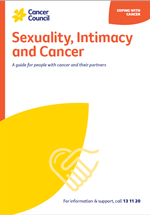- Home
- Cancer Information
- Living well
- Living well after cancer
- Managing side effects
- Impact on sexuality and intimacy
Impact on sexuality and intimacy
Treatments for some types of cancer can directly affect your physical ability to have sex or to enjoy it. More generally, many cancer treatments can affect your desire to be intimate with others. These changes may be temporary or ongoing and can be difficult to deal with.
Learn more about:
- Overview
- How cancer treatment can affect sexuality
- Managing changes in your sex life
- Podcast: Sex and Cancer
Overview
Some people say they were not prepared for the sexual changes caused by treatment. Others say they avoid all forms of intimacy, including hugs, kisses and sharing feelings, because they’re afraid this may lead to sex when they don’t feel physically up to it.
You may not even be aware that you aren’t taking an interest in sex or being as intimate as you were before. If you have a partner, they may feel confused or uncertain about how to react. Talk openly with your partner about how you’re feeling and any fears you have about sex. Ask your partner how they’re feeling – they may be worried about hurting you or appearing too eager. You may want to ask your partner to do things differently or talk about other ways of being intimate.
Some people worry that they will never be able to enjoy sex again. Most people can have a fulfilling sex life after cancer, but you may need to find different ways to give and receive sexual pleasure. Like any new skill, this will take time and practice. Some people say that because they try new things, their sex lives actually end up being much better after cancer.
For most people, sex is more than arousal, intercourse and orgasms. It involves feelings of intimacy and acceptance, as well as being able to give and receive love. Although sexual intercourse may not always be possible, closeness and sharing can still be part of your relationship.
How cancer treatment can affect sexuality
General |
Females |
Males |
|
|
|
Managing changes in your sex life
- Seek professional advice and support. Talk to your doctor or nurse or ask for a referral to a sex therapist or counsellor. They can suggest ways to manage changes that affect your sex life.
- Try hormone creams and vaginal moisturisers to help relieve vaginal discomfort and dryness.
- Ask your doctor about medicines to help with erection problems.
- If surgery or radiation therapy has narrowed or shortened the vagina, you may be advised to use vaginal dilators to help keep the walls of the vagina open and supple. Using dilators can be challenging. Your doctor, nurse or physiotherapist can tell you where to get dilators and how to use them.
- Show affection by touching, hugging, massaging, talking and holding hands.
- Be intimate at the best time for you (e.g. when your pain is low or energy levels high).
- Talk to your GP if your low libido might be related to depression.
- Spend more time on foreplay and try different ways of getting aroused. Do whatever makes you and your partner feel good.
- Use a water-based or silicone-based lubricant during sex. Avoid products with perfumes or colouring to reduce irritation.
- Try different positions during sex to work out which is the most comfortable for you and to control penetration.
- If sexual penetration is painful or difficult, explore other ways to feel pleasure.
- If you feel comfortable, stimulate yourself. This may reassure you that you can still feel aroused.
For more on this, see Sexuality, intimacy and cancer.
Podcast: Sex and Cancer
Listen to more of our podcast for people affected by cancer
More resources
Prof Michael Jefford, Medical Oncologist and Director, Australian Cancer Survivorship Centre, Peter MacCallum Cancer Centre, VIC; Lucy Bailey, Nurse Counsellor, Cancer Council Queensland; Philip Bullas, Consumer; Dr Kate Gunn, Clinical Psychologist and Senior Research Fellow, Department of Rural Health, University of South Australia, SA; Rosemerry Hodgkin, 13 11 20 Consultant, Cancer Council WA; Prof David Joske, Clinical Haematologist, Sir Charles Gairdner Hospital and Clinical Professor of Medicine, The University of Western Australia, WA; Kim Kerin-Ayres, Clinical Nurse Consultant, Cancer Survivorship, Concord Hospital, NSW; Sally Littlewood, Physiotherapist, Seymour Health, VIC; Georgina Lohse, Social Worker, GV Health,VIC; Melanie Moore, Exercise Physiologist and Clinical Supervisor, University of Canberra Cancer Wellness Clinic, ACT; June Savva, Senior Clinician Dietitian, Nutrition and Dietetics, Monash Cancer Centre, Monash Health, VIC; Dr Elysia Thornton-Benko, Specialist General Practitioner and Research Fellow, University of New South Wales, NSW; Prof Janette Vardy, Medical Oncologist, Concord Cancer Centre and Professor of Cancer Medicine, The University of Sydney, NSW; Lyndell Wills, Consumer.
View the Cancer Council NSW editorial policy.
View all publications or call 13 11 20 for free printed copies.
Need to talk?
Support services
Life after cancer treatment
Programs and support for people who have finished treatment
ENRICH – a free healthy lifestyle program
A face-to-face exercise and nutrition program for cancer survivors
Cancer information
Emotions and cancer
Learn about the different emotions you may experience after a cancer diagnosis
Nutrition and cancer
How to eat well during and after cancer treatment

